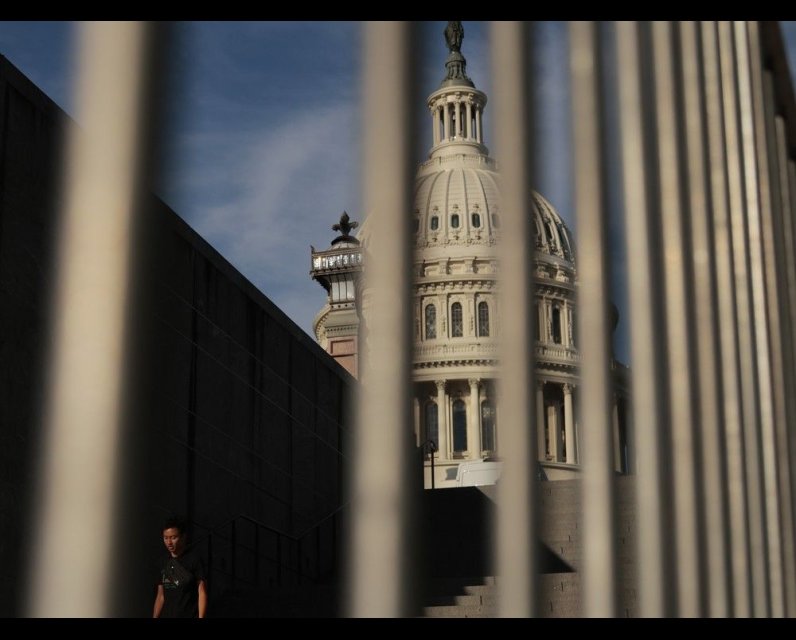U.S. government shutdown: Canadians should expect delays and long wait times at airports, experts warn

The U.S. government shutdown could be a “headache” for Canadian travellers leaving the country or returning home if it drags on, says a political science expert.
Departments are firing employees en masse while some continue to operate by relying on unpaid workers. There are roughly 550,000 federal employees that could be furloughed, the Government Executive reported .
“American airports and border crossings will remain open during the government shutdown, but Canadians should expect longer travel delays and wait times at the airport,” said Lewis Krashinsky, a postdoctoral fellow in the University of Toronto’s department of political science.
“A government shutdown has many serious consequences, some that we can predict and others that we can’t. Unfortunately, there does not seem to be much optimism that this will be resolved quickly.”
The shutdown went into effect on Wednesday at midnight. Departments are firing employees en masse while some continue to operate by relying on unpaid workers. There are roughly 550,000 federal employees that could be furloughed, the Government Executive reported .
Here’s what Canadians need to know in terms of planning travel to the U.S.
How will the government shutdown affect Canadians travelling to and from the U.S.?The Department of Transportation plans to furlough 23 per cent of its employees, according to its contingency plan put in place in case of a shutdown . It also asked 55 per cent of its employees to work without pay, including air traffic controllers, Krashinsky told National Post in an emailed statement.
“If the shutdown drags on and some of those workers decide to stop showing up to a job they are not being paid for, then air travel and border crossings could become a real headache for Canadian travellers,” he said.
He advised that Canadians “skip that trip to the U.S.” if they can.
“Go somewhere in Canada instead, go see the fall foliage. For Canadians already in the U.S., it’s probably best to return home sooner rather than later. Driving is probably the better bet to air travel.”
Immigration lawyer Rosanna Berardi told National Post said that because U.S. Customs and Border Protection is considered an essential service, land borders will remain open. She said travellers should “plan accordingly by allowing extra time when crossing into the United States.”
“At U.S. Consulates in Canada, delays and potential closures may occur depending on staffing levels and available resources, which could affect visa appointments and document processing,” said Berardi.
She said that U.S. Citizenship and Immigration Services will continue to process applications, adding that it operates on fee-based funding.
“However, Canadian citizens with pending petitions — such as H-1B visas or green card filings — may experience slower turnaround times,” she said. An H-1B visa is for people who want to be approved to work in a specialty occupation in the U.S.
“The shutdown is another piece of the complex immigration puzzle from this Administration. It’s important for travellers to leave extra time for travel and be aware of any policy changes,” said Berardi.
Global Affairs Canada did not immediately respond to National Post’s request for comment.
Are there risks for Canadians currently in the U.S.?“During a shutdown, there are serious risks for how the U.S. might respond to natural disasters, wildfires, and other emergencies,” said Krashinsky. According to the U.S. Environmental Protection Agency’s contingency plan , nearly 90 per cent of employees will be furloughed.
“Monitoring of weather forecasts and hazardous conditions will suffer,” he said.
Canadians with plans to visit national parks in the U.S., like Yellowstone, the Grand Canyon and Glacier National Park, “will likely have significantly reduced services and programs,” he said.
According to a contingency plan published by the Interior Department, which runs the U.S. National Parks Service, 64 per cent of its staff are expected to be furloughed. Nearly 15 per cent of parks employees have been asked to work without pay, said Krashinsky.
How will the shutdown affect diplomatic relations between Canada, U.S.?Krashinsky said the focus of American politicians is likely to remain within the U.S. at this time.
“The most likely consequence is that American leaders will turn much more of their attention inward,” he said. “Progress towards a new trade agreement will likely be limited as most American eyes will be looking to how to end the shutdown and bridge the gap between Congressional Republicans and Democrats.”
Which U.S. departments are open?Each department is dealing with the shutdown differently, with most that are deemed essential staying open in some capacity.
The Department of Transportation says online that portions of it are “currently in shutdown/furlough status due to a lapse in appropriations.” It urges people to monitor the website for updates on its operating status.
U.S. Department of State Consular Affairs said “consular operations domestically and abroad will remain operational,” including passports, visas, and assisting Americans abroad. “Certain domestic support for consular operations will be suspended,” it said.
Due to the lapse in appropriations, this account will not be updated regularly until full operations resume, with the exception of urgent safety and security information.Consular operations domestically and abroad, including passport and visa services and assistance for… pic.twitter.com/FXQbcUc9fL
— Travel - State Dept (@TravelGov) October 1, 2025
U.S. Immigration and Customs Enforcement said in a post on X that there would be “no change to U.S. immigration laws or border enforcement.”
“Rumours that a U.S. government shutdown will allow illegal immigrants to enter the United States are false,” it said, adding that its efforts “remain unchanged.”
DURING A GOVERNMENT SHUTDOWN: There is NO CHANGE to U.S. immigration laws or border enforcement. Rumors that a U.S. government shutdown will allow illegal immigrants to enter the United States are FALSE. U.S. immigration laws and enforcement efforts remain unchanged.… pic.twitter.com/nugTv13rJn
— U.S. Immigration and Customs Enforcement (@ICEgov) October 1, 2025
Secretary of the U.S. Department of Homeland Security (DHS) Kristi Noem said DHS law enforcement officers will continue to work during the shutdown, but more than a total of 200,000 of them (150,000 officers and 50,000 members of the military) would go without pay.
What led to this shutdown?Our @DHSgov law enforcement officers will continue to work throughout the Democrats’ Shutdown to make sure our homeland is safe and secure. More than 200,000 of these patriots will go without pay. The Democrats will be forcing over 150,000 officers and nearly 50,000 members of…
— Secretary Kristi Noem (@Sec_Noem) October 1, 2025
The Trump administration is pointing the finger at Democrats, with the White House calling it a “Democrat shutdown,” after a deal on funding couldn’t be made by Congress. Republicans put forth a seven-week, short-term plan that Democrats said they wouldn’t accept without extending Affordable Care Act subsidies.
“Our entire government is shut down because Republicans in power refuse to lower health care costs,” said U.S. Senator Elizabeth Warren on X . The Trump administration’s rapid response account replied , saying the government shutdown was due to Democrats demanding the addition of $1.5 trillion in “new spending, including taxpayer-funded health benefits for illegal aliens.”
The last time there was a government shutdown in the U.S. was in 2018, during Trump’s first term, ABC News reported . It was the longest in history and lasted 35 days.
Our website is the place for the latest breaking news, exclusive scoops, longreads and provocative commentary. Please bookmark nationalpost.com and sign up for our daily newsletter, Posted, here.


Comments
Be the first to comment